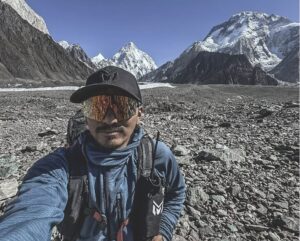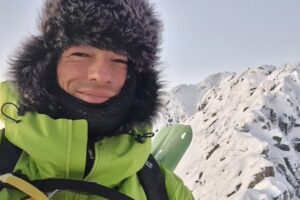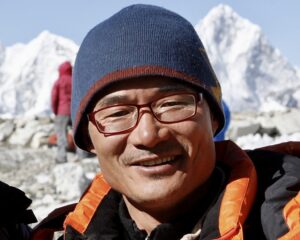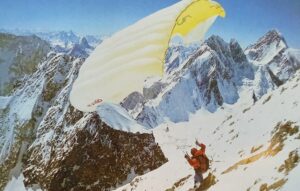After summiting and partially skiing down Nanga Parbat, Cala Cimenti and Francesco Cassardo of Italy made the first ascent of Gasherbrum VII (6,955m). The pair intended to bring off this remarkable climb under the social media radar. Unfortunately, the climb turned into an unexpected melodrama when Cassardo, 33, fell on the way down and slid 500m before stopping, with significant injuries.
Cimenti sent out an SOS, which was picked up by –- again! — Denis Urubko and Don Bowie. They immediately set off on foot from neighboring Gasherbrum II. Jarek Zdanowicz and Janusz Adamski of Poland, as well as Marco Confortola (a professional guide and rescue technician), also began making their way over to the accident scene.

Cala Cimenti (left) and Francesco Cassardo. Photo: Cala Cimenti
Urubko and Bowie hurried to Gasherbrum VII and followed the Italians’ footprints in the snow until they reached the accident site at about 6,400m. Here, they found Cimenti trying to help his injured partner.
The three of them managed to lower down Cassardo down to Camp 1 and spent the night there. Meanwhile, Confortola, the Italian Embassy in Pakistan and Cassardo’s home team kept requesting a helicopter, which was finally dispatched to the scene early this morning and airlifted Cassardo to the hospital in Skardu. Marco Confortola coordinated the rescue and helicopter evacuation from Base Camp.

Gasherbrum VII. Photo: Ali Usman Baig
Later today, Cimenti lavished praise on the volunteer rescuers: “Denis Urubko, Don Bowie and the two Poles were angels,” he said. “Without them, we would never have made it, and Francesco would not have been able to spend another night at 6,300m.”
Cimenti added that Urubko had just summited Gasherbrum II, and that Don Bowie had altruistically sacrificed his own summit bid in order to help. “The helicopter would never have been able to pick us up at the scene of the accident,” he said. “There were too many seracs.” Also vital was the oxygen Urubko provided to the stricken climber.
Cassardo was conscious and lucid during the evacuation, and Skardu doctors noted no brain or spinal trauma, just a broken wrist, possibly a broken elbow and fingers, and some frostbite on his hands and nose. He is slated to be transferred to Islamabad tomorrow.
Some reflection
The help of climbers from different expeditions was again key to saving a life. Luckily, those involved in the rescue were highly experienced in such labors. Urubko, in particular, seems to be there nearly every time there’s an accident, from Iñaki Ochoa on Annapurna to Elisabeth Revol on winter Nanga Parbat.
The embassy and home teams were also experienced. The only drawback was the helicopter delay, allegedly because of “bureaucratic problems.” Cimenti’s home team suggested an additional issue: All available helicopters were busy shuttling climbers from K2 and Broad Peak who did not wish to trek back to Skardu.
It remains to be seen whether Urubko will have time and be rested enough for his planned new route on Gasherbrum II. Down the road, he might need to make time to receive yet another medal: He was awarded for his gallant attempt to save Iñaki Ochoa back in 2008. And just weeks ago, he received the French Legion of Honour for his part in the successful rescue of Elisabeth Revol.





